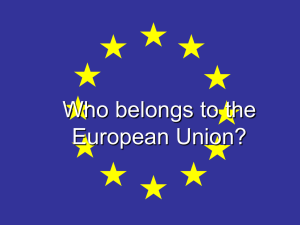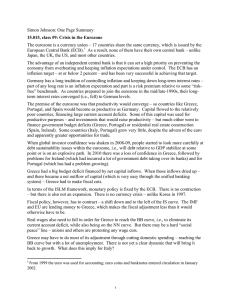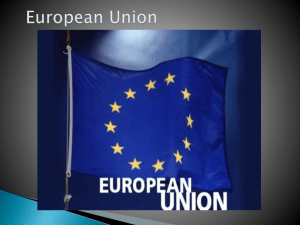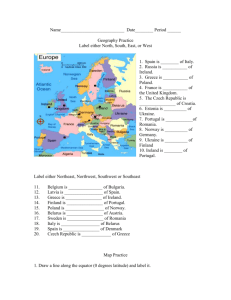WILL THE € uro SURVIVE?
advertisement
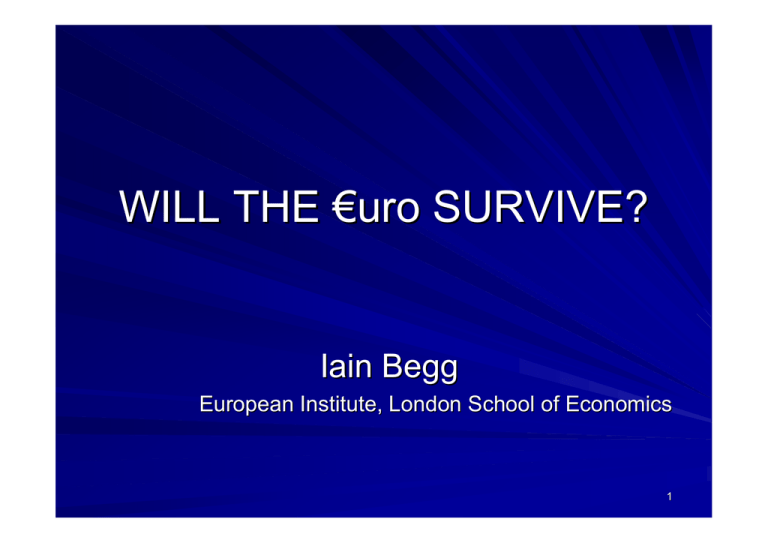
WILL THE €uro SURVIVE? Iain Begg European Institute, London School of Economics 1 YES But please don’t leave yet… 2 KEY FEATURES OF EURO AREA ECONOMIC GOVERNANCE Primary imperative for ECB: price stability Fiscal policy remains with the Member State –As does supply-side policy Caught in trap of 16/27 membership –Hence confusion in responsibilities of different actors Necessitates extensive resort to coordination >> The EU is NOT a United States of Europe, but more a united Europe of states 3 THE INSTITUTIONAL MIX ECB ECOFIN & EUROGROUP 4 THE INSTITUTIONAL MIX COMMITTEES: Economic policy Employment Social protection ECONOMIC AND FINANCIAL COMMITTEE MACROECONOMIC DIALOGUE MEMBER STATES ECB ECOFIN & EUROGROUP COMMISSION ECOSOC & OTHERS NATIONAL CBs 5 PRINCIPAL SHORTCOMINGS ECB as sole, EU level economic actor Aggregation of national policies: policy mix Certainly fiscal, but also supply-side Wrong focus of surveillance Especially, neglect of imbalances and their causes No explicit crisis resolution mechanism – Tricky wording of ‘no bail-out’ clause in Treaty Political economy of implementation – The ‘why comply?’ Catch-22s – legitimacy 6 LONG-TERM INTEREST RATES SINCE START OF FINANCIAL ‘CRISIS’ Interest rate, % 12 10 8 6 4 2 Au g07 O ct -0 7 De c07 Fe b08 Ap r-0 8 Ju n08 Au g08 O ct -0 8 De c08 Fe b09 Ap r-0 9 Ju n09 Au g09 O ct -0 9 De c09 Fe b10 Ap r-1 0 Ju n10 Au g10 0 Germany Ireland Greece Spain France Italy Portugal 7 GROWING DIVERGENCE IN CURRENT ACCOUNT OF BoP % of GDP 10 5 0 -5 -10 -15 2000 2001 Germany 2002 2003 Netherlands 2004 Greece 2005 2006 Spain 2007 France 2008 Italy 2009 Portugal 2010 2011 Ireland 8 TRENDS IN CONSUMER PRICES OF EURO AREA COUNTRIES, 1999-2010 Change in price level over period, % 70.0 60.0 50.0 40.0 30.0 20.0 10.0 1999-2003 2003-2007 Sp ai n G re ec e Sl ov en ia Sl ov ak ia C yp ru Lu s xe m bo ur g an d Ire l Po rtu ga l M al ta It a ly G er m an y Fi nl an d Fr an ce Au st ria Be lg iu N m et he rla nd s Eu ro ar ea 16 0.0 2007-2010 9 EXTENT OF ULC SHIFTS ….pre-crisis! Member State Change 2000-08, % Spain 29.3 Italy 26.1 Greece 25.0 Portugal 21.8 Belgium 17.2 France 17.1 Germany -0.2 Euro area 14.8 UK 22.8 Poland 6.8 10 “THINGS THAT CAN’T GO ON FOREVER… DON’T” Herb Stein [Nixon’s economic adviser] 11 …..THEN CAME MAY 2010 Greece Ireland AND NOVEMBER 2010…AND? 12 DISTINCT ‘PATHOLOGIES’ PUBLIC SECTOR •Weak & profligate •Too costly Greece Portugal? BANKING CRISIS •Systemic risk •Bail-out SOVEREIGN DEBT CRISIS Ireland Spain next? COMPETITIVENESS •Unit labour costs Greece Portugal Spain 13 STRUCTURE OF DEBT, EXCLUDING FINANCIAL SECTOR % of GDP, 2009 400 350 300 250 200 Compani es 150 Househol d Publ i c 100 50 0 Source: Laurence Boone, Barclays Capital 14 EXPLAINING RECENT PROBLEMS Germany’s changed role in Europe – Traditionally the ‘good European’ – But new generation of leaders and new times – Awkward domestic constraints The constitutional court – most trusted institution Public opinion, articulated by Bild Zeitung Unintended consequences of Deauville – Correct for long-term – But threw petrol on the flames Burning Ireland and igniting Portugal 15 EMERGING SOLUTIONS: OUTCOME OF van ROMPUY TASK FORCE Better macroeconomic surveillance – Macroeconomic, with focus on risky imbalances Internal, but with ramifications for external – Structural indicators Fiscal frameworks and/or rules at national level Changes in the Stability and Growth Pact – Debt indicator to complement 3% deficit limit A new sanctions regime Preferably, to be achieved within existing Treaty 16 THE MEANS Dark arts of rules & persuasion Better prevention along with coordination – The two semester approach New excessive imbalances procedure ‘EIP’ – – – A scorecard with ‘alert’ indicators But leavened by judgement In-depth reviews: is action needed? If the latter, recommendations will be issued Sanctions for euro area members Only euro area members vote National rules consistent with SGP 17 UNFINISHED…OR TOO HARD Crisis resolution mechanism – Unease about involvement of IMF – Need for mini-Treaty change Avoiding case before German Constitutional Court – Concerns about moral hazard Nature and scope of possible EMF Euro-bonds as a means of pooling risk Moral hazard concerns again; adverse incentives The spectre of ‘fiscal’ union – If only we knew what it meant 18 CONCLUDING REMARKS Many political economy issues Subsidiarity: who controls? Winners and losers: who is really being rescued? Germany is pivotal – Usually does the right thing … eventually Progress towards financial stability Yet there is, effectively, no ‘European tax-payer’ New realism about costs of non-compliance Doubts nevertheless persist about delivery >> Political will, that elusive ingredient 19 SO, IS THE EURO IN PERIL? My answer: It remains part of the solution, but is at a tricky crossroads 20
